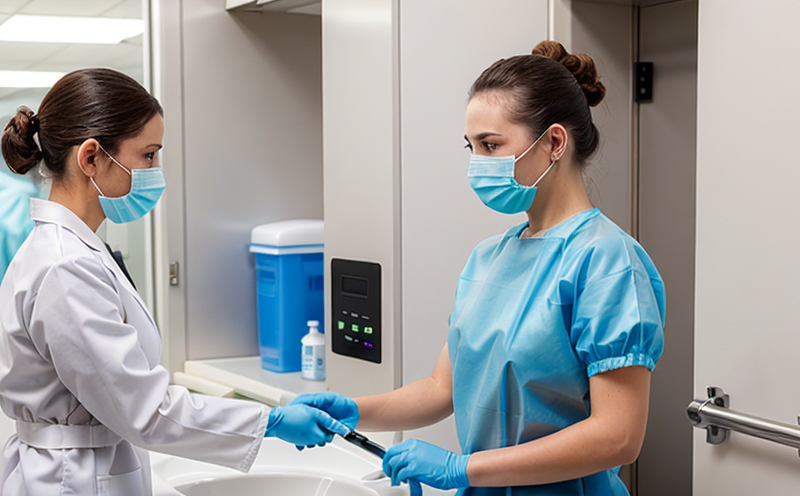EN 14683 Medical face masks Bacterial filtration efficiency test
The EN 14683 standard is a vital component in ensuring medical face masks meet the necessary hygiene standards. This particular section focuses on the bacterial filtration efficiency (BFE) tests conducted under this standard, which are crucial for determining how effective a mask is at filtering out bacteria.
Bacterial filtration efficiency testing measures the ability of a facemask to filter out particles that are typically 3 microns in size or larger. This test is essential because it evaluates whether the material used in the face mask can effectively block harmful microorganisms from entering the respiratory tract, thereby protecting healthcare workers and patients.
The test involves placing the face mask between two chambers: a contaminated air chamber on one side and a clean air chamber on the other. A known volume of contaminated air is then passed through the mask, and the amount of bacteria that passes through to the clean air chamber is measured. The percentage of bacteria retained by the mask gives its BFE value.
For accurate results, it's crucial to follow the prescribed procedure meticulously. Specimen preparation involves ensuring the face masks are free from any foreign materials or contaminants before testing. Once prepared, the masks undergo rigorous testing using specialized equipment designed for this purpose. The results of these tests provide critical insights into the effectiveness of the mask in protecting against bacterial contamination.
The importance of such tests cannot be overstated, especially in the context of healthcare settings where hygiene and infection control are paramount. Ensuring that medical face masks meet the required standards not only enhances patient safety but also protects healthcare workers from potential infections. This is particularly relevant in today's world, where respiratory health remains a significant concern.
The EN 14683 standard sets stringent criteria for bacterial filtration efficiency, and compliance with these standards is crucial for manufacturers to ensure their products are safe and effective. By adhering to this standard, medical face mask producers can gain credibility within the industry and demonstrate their commitment to public health and safety.
Understanding the specifics of the test procedure helps in selecting appropriate materials and designs that enhance BFE performance. This knowledge is invaluable for R&D engineers and quality managers looking to innovate and improve upon existing products or develop new ones.
In summary, bacterial filtration efficiency testing under EN 14683 is an indispensable process for ensuring medical face masks meet the highest hygiene standards. By accurately measuring how well a mask filters out bacteria, this test provides essential data that can be used to enhance product performance and protect public health.
Applied Standards
| Standard | Description |
|---|---|
| EN 14683:2019 | This European Standard specifies the essential requirements and performance criteria for medical face masks intended to protect against contamination of the respiratory system. |
| BFE (Bacterial Filtration Efficiency) | The ability of a facemask material to retain bacteria, measured as a percentage of bacterial particles retained by the mask material. |
| ISO 22603:2017 | Performance criteria for medical face masks used in healthcare environments. It provides additional guidance on testing and certification of these products. |
Customer Impact and Satisfaction
The results from the bacterial filtration efficiency test significantly impact customer satisfaction and trust in medical face masks. When customers know that their healthcare providers are using masks that meet stringent hygiene standards, they feel more secure about the quality of care they receive. This is especially true in high-risk environments where the stakes for infection control are high.
Manufacturers who adhere to EN 14683 not only ensure compliance with regulatory requirements but also enhance their reputation and market position. By demonstrating a commitment to producing safe and effective medical face masks, they can build long-term customer relationships based on trust and reliability.
The test results are shared transparently with customers, which helps in building confidence. Healthcare facilities often look for certifications or reports that confirm the masks meet these standards, thus ensuring that their staff is using the most reliable protective equipment available.
Moreover, these tests play a crucial role in educating both manufacturers and users about the importance of hygiene in medical settings. By understanding the results of such tests, stakeholders can make informed decisions that prioritize safety and effectiveness.
Competitive Advantage and Market Impact
The ability to demonstrate compliance with EN 14683 and successful completion of bacterial filtration efficiency tests provides a significant competitive advantage in the medical face mask market. Hospitals, clinics, and other healthcare providers often prefer suppliers who can offer certified products, which ensures that the masks meet or exceed international standards.
Manufacturers who excel in these tests are better positioned to secure contracts with major healthcare facilities and government agencies. They also benefit from enhanced brand reputation and customer loyalty, as satisfied customers are more likely to recommend their products to others.
The market impact of meeting these standards is profound. It not only ensures that the product is safe but also opens doors for broader adoption across various sectors. This can lead to increased sales and market share, making it a critical factor in maintaining a strong presence within the industry.
Furthermore, compliance with EN 14683 and successful bacterial filtration efficiency testing sets a benchmark that competitors must meet to stay relevant. This creates a competitive edge that can be leveraged for strategic business growth and expansion.





